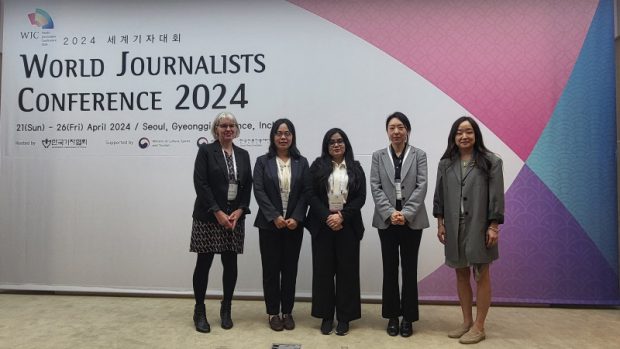
By Ivan Lim,
Former AJA President, Contributor to AsiaN
Seoul: Without doubt, the Russia-Ukraine war and the Hamas-Israel hostilities were upper-most in our minds as we sat down for a pow-wow on War and Peace and the responsibilities of the media.
But any concern that spirited discourse on the conflicts would turn partisan and lead to condemnations of the warring parties, evaporated as the participants spoke up, not out, dispassionately.
My hunch that someone might table a controversial resolution on the war at the end of the session was entirely unfounded.
Instead, the flow of the proceedings was professional.
Hankoreh newspaper reporter Noh Ji Won, who was sent to the Polish-Ukrainian border and the capital Kyiv when Russian invaded in February 2022, was concerned about the ‘fallout’ from government travel ban to war zones, including Ukraine. (This, after a Korean missionary was kidnapped by the Taliban in Afghanistan in2007. A freelance photographer Jang Jin-young who travelled to Kyiv to cover events there was charged for violating the ban.)
Noh said quality of reporters suffer if journalists do not do frontline news coverage.
Her concern: “The decline in quality of stories will inevitably lead to a weakening of competitiveness of Korea media on the global stage.”
Chen Yingqun, senior reporter of China Daily which covered the Russian-Ukraine and Hamas-Israeli conflicts extensively, underscored the principle of balanced and objective reporting.
She said “some international media channels, either due to ideological bias or influenced by political or economic forces, hare greatly amplified the voices of one side while turning a deaf ear to the voices of the other. That does a grave disservice not only to their audiences but also to truth.”
What Is troubling, she added is that “False and incorrect reporting on war or conflict could lead to
misunderstanding and confusion among the public, causing unnecessary panic and anxiety.”
Reflecting the official line, Chen said her paper’s coverage of “Russia-Ukraine and Israeli-Palestine conflicts, China has maintained an objective and fair stance, insisting on promoting peace talks and hoping to contribute to world peace.”
11.Putting one’s life on the line might be many a war correspondent’s credo or professional hazard.
But peace journalism advocate, Anum Hanif wondered: “You can get the best story but if you go any further in conflict zone, you might die; you only have to option: protect yourself or acquire the story.”
For the producer at Hum News Network, Pakistan, safety comes first: “Always choose to protect yourself. Journalist lives are important. One journalist can tell stories of many.”
Anum highlighted the role of journalists as “catalyst for peace” who could help promote solutions that put mutual respect and human dignity first in the effort to bring about world peace during conflicts.
There is a caveat: Journalists can play their part effectively only they are act independently and not parrot the government’s line.
Nicola Smith, Asia correspondent of The Telegraph, seconded Anum’s point on speaking truth to power…
A “witness” in many conflicts from India, Sri Lanka, Afghanistan, Myanmar, and Hong Kong to Ukraine, she affirmed that female correspondents might have this edge over their male counterparts: easier access to and greater rapport with people in war zones.




